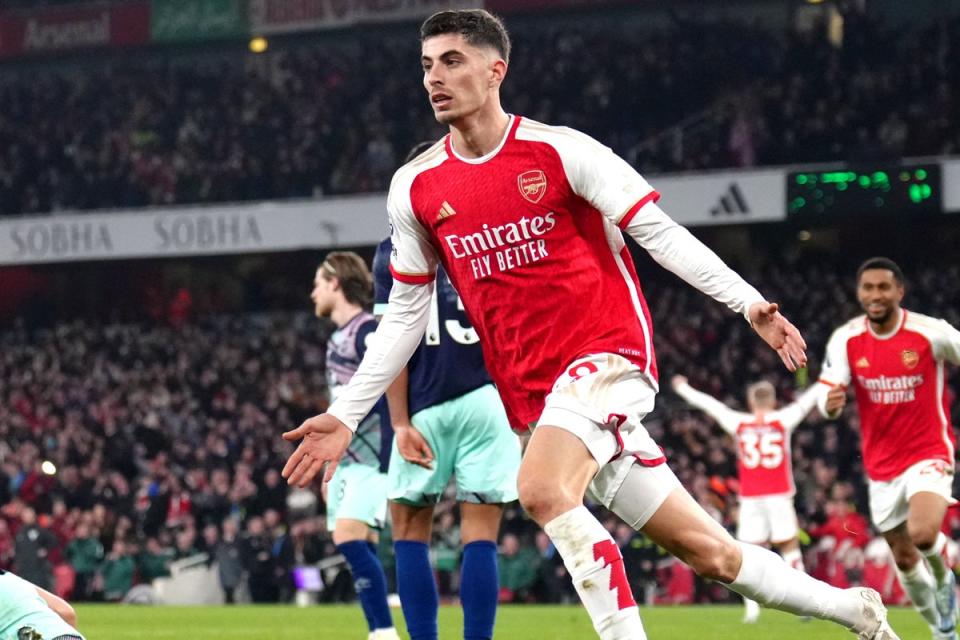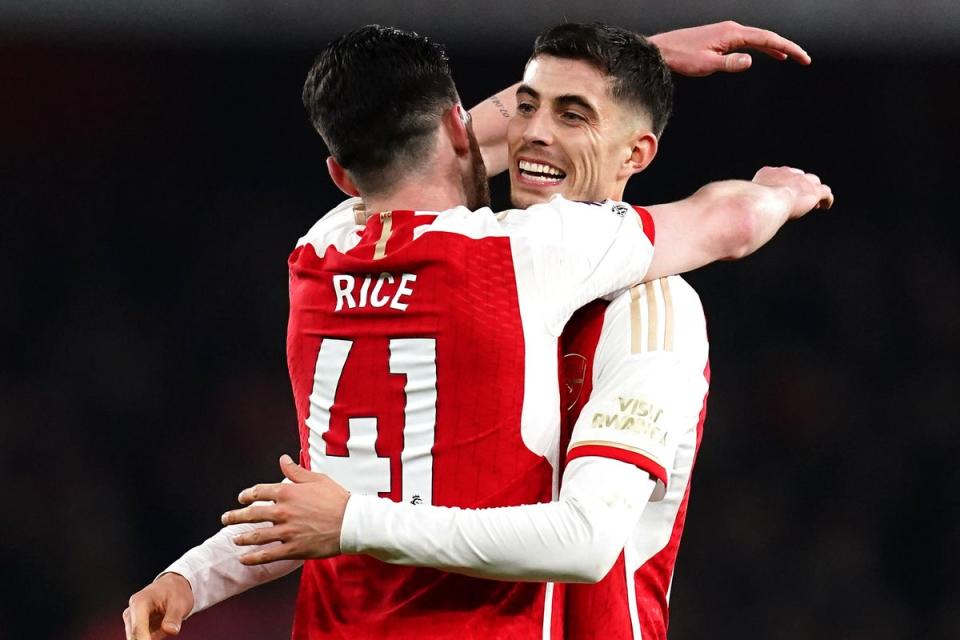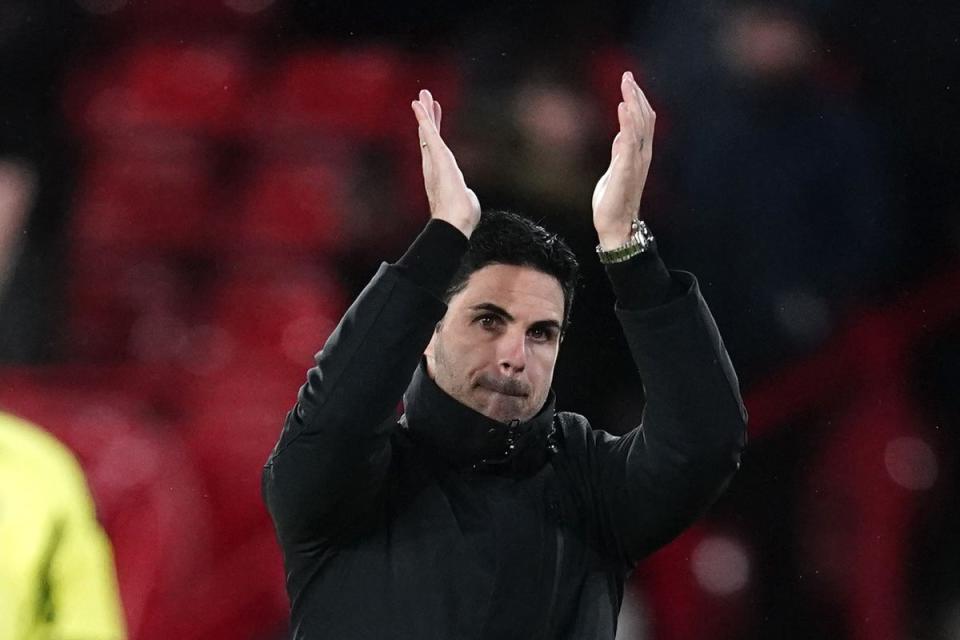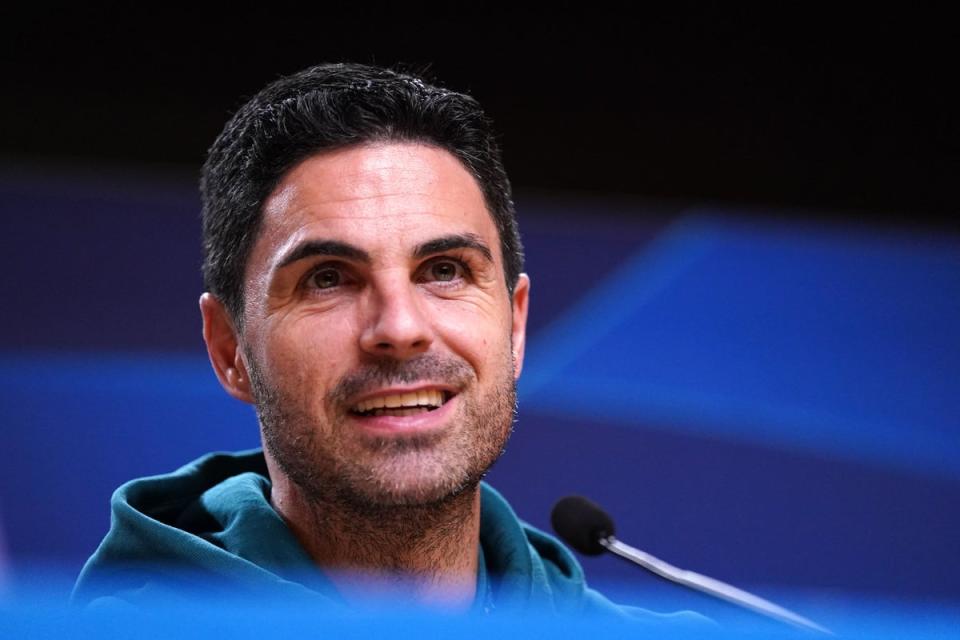Mikel Arteta’s painful Arsenal experience holds the key to Porto victory
Around the Arsenal training ground over the last 48 hours, there’s been a new giddiness, at least for this team. Anyone can sense the anticipation to play in what feels like the first major European home game in a long time. Mikel Arteta radiated it on the eve of the second leg against Porto, as he told fans to “bring your energy, bring your noise and let’s do it together”.
The Arsenal manager did insist that emotion needs to be controlled, as he spoke about going through “certain phases” in trying to turn over this 1-0 deficit.
One phase evidently matters most to him, as he essentially revealed just how much he has been thinking about this. That’s the opening spell. Arsenal have recently become adept at finishing games almost as soon as they start. It is a real danger for Porto on Tuesday, although something that manager Sergio Conceicao will doubtless be preparing for, given that Pep Guardiola made such a point of mentioning it.
After Manchester City’s 1-1 draw with Liverpool, the Catalan said Arsenal just “need 25 minutes to go 3-0 up”. Jurgen Klopp echoed that by talking about a side “firing on all cylinders”. They’re on turbo from kick-off.

It has been the most striking feature of Arsenal’s return to form, as well as the top of the table. Arteta’s side have scored 11 goals before the 25th minute of the eight games since returning from their January break. It’s quite a change from the mental block they seemed to suffer before that. The handbrake is off, 0-100 in seconds from kick-off, whatever metaphor you want to use.
Some of those goals have admittedly come in gluts rather than in each game, but that almost sets more of a pattern.
All of Burnley, Newcastle United and Sheffield United were beaten before the games even got going, with West Ham United also defeated in a storm of first-half goals. Not quite so early, but of unstoppable force.
Such immediate force fosters the feeling that you won’t even get the chance to compete with a team, which is a powerful factor. It can condition entire games, as well as how opposition sides approach a match.
Arteta knows all this from painful experience. He managed Arsenal when they were subjected to such devastation in the 4-1 defeat to Manchester City last April, and then played for them as Brendan Rodgers’s Liverpool went 4-0 up after just 20 minutes in a purported title showdown in 2013-14. Arteta actually scored the consolation penalty in a 5-1 defeat at Anfield that day. It fuelled an approach that propelled an unlikely title challenge for Liverpool that season, with 13 goals scored before the 25th-minute mark of an 11-game winning streak.
That followed a lineage, that Arteta will be equally conscious of. Arsenal’s first title under Arsene Wenger was secured through similar flurries. Manchester United might have thought they had a chance in that run-in, only to watch Arsenal go 3-0 up against Blackburn Rovers in 14 minutes and 3-0 against Wimbledon in 19.

It can create a frightening momentum. Having experienced it first-hand, Arteta knows how powerful it can be for a big European night, above all. That was why the response to the 1-0 first-leg defeat so pleased him.
Arsenal had been unusually flat in attack in the Dragao, but part of that was Porto’s sophisticated defensive display. Anyone watching what happened last season might have thought the manner of it could derail Arsenal but not a bit of it. They immediately came out against Newcastle in the next game with full force, just bludgeoning Eddie Howe’s side until Sven Botman put into his own goal.
This is now what Arteta wants from the second leg. Like Rodgers with Liverpool a decade ago, he has been honing drills to have the players come out explosively. It has been a focus of training. Players like Bukayo Saka and Gabriel Martinelli - if fit - are extra effective for this. It entirely fits with their whole game. There is an extra tactical impetus there, too, since it can serve to immediately undo Porto’s strong defensive line.
Conceicao’s side have generally had a poor season, so Arteta will know that team can come apart. That would only reflect a growing financial gap between such clubs. Arsenal still have to make it count, though.
The greater wonder is what happens if Arsenal don’t score early, or are left to wait a long time. There has been this growing perception that they are too emotional as a team, too prone to swing with events. It is why some at Arsenal might not fully appreciate the Rodgers comparison, either. That Liverpool team lived off the chaos until they eventually ran out of energy, and struggled in more tactical games. One, infamously, was against a counter-attacking former Porto manager in Jose Mourinho at Chelsea.
Arteta already has a ready-made riposte to that criticism, though. You only have to look at Saturday against Brentford, and how many late goals Arsenal actually scored in the spell before Christmas. That was where this debate about “emotion” came from the other side; that too many late goals would emotionally sap Arsenal. His entire mission this season has been to complete the team, in personnel, and in potential approaches. It’s why Arteta spoke about phases.

His team have actively prepared for different game states. This is actually what Ole Gunnar Solskjaer did rather astutely when Manchester United came back against Paris Saint-Germain in 2018-19. He had his team knowing exactly what pace to play at depending on how the game was going and what minute it got to.Arteta is now doing similar, and the truth is there is more to him as a manager than Solskjaer and more to Arsenal as a team.
The Basque would say his team can do it early or do it late, they can be fast or slow.
His preference for Tuesday, however, is to just accelerate from the off; to leave it beyond doubt while creating panic among this Porto side.
This is why there’s more to his call for noise than normal. It all plays into what is required - that raucous big-game atmosphere that amplifies the players’ qualities.

There’s more to the match, too. While the Champions League is the one major trophy Arsenal haven’t won, and the biggest of all, it doesn’t feel unfair to say this season has become about the title race. There’s the 20th anniversary of the invincibles. There’s all that momentum from these fast starts. There’s a huge chance.
Should Arsenal win this game and go through, it will leave them in the best possible mental shape before an unusually long 19-day break until another grand showdown with Manchester City.
If they go out, though, that’s an awful lot of time to dwell on it all. A fast start on Tuesday night might be essential to how this season finishes.

 Yahoo Sport
Yahoo Sport 



































































